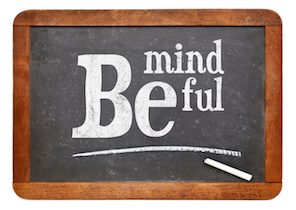Mindfulness Skills for Bipolar Disorder

Life with bipolar disorder brings a sort of intensity with it so mindfulness skills for bipolar disorder can help. The highs and lows of bipolar disorder can be difficult to manage. If you live with bipolar disorder, mindfulness skills are a great way to help you observe and track your mood so that you can better manage symptoms when you notice changes.
Why Use Mindfulness Skills for Bipolar Disorder?

There are awesome mental health benefits to practicing mindfulness according to Harvard Medical School as noted in 15 Amazing Mindfulness Benefits. Mindfulness helps us get in touch with our thoughts, feelings, sensations, and experiences. The increased sense of connection to ourselves can be of service by helping us to recognize changes in our mood or disturbances in our thought processes. The sooner we notice these changes that can come with the highs and lows of bipolar disorder, the quicker we can take action to try to manage symptoms. Mindfulness can reduce stress and anxiety, as well as help with depressive episodes (Mindfulness Can Calm Anxiety). People who practice mindfulness also tend to have a more positive and compassionate outlook.
Simple Mindfulness Skills for Bipolar Disorder
Adding mindfulness into your routines doesn't have to be time-consuming. Start with five minutes each day. Find a place that's quiet, or where you'll be able to focus and relax. Have a seat, make yourself comfortable and try some of these short exercises.
- Observe. Some folks like to start with their breathing as it's an easy way to anchor yourself. Notice yourself inhaling and exhaling. Feel your body expand and contract as you breathe deeply. Note the sensations that you feel.
- Describe. Once you've made some observations, take some mental notes about what is happening in the moment. Describe what you can see, hear, smell, or feel. Are you sitting outside? Can you feel the warmth of the sun on your skin? Can you hear the birds chirping?
- Non-judgment. It's easy to make snap judgments and react to those judgments when we caught up in our emotions. Practicing non-reactivity means that you are aware of your thoughts and feelings, pleasant and not so pleasant, without attaching a judgment to them. Let your feelings come and go. There is no need for action here, that comes later. The focus is to increase your self-knowledge.
If you notice that your mind wanders or that you're struggling to concentrate initially, don't fret. Mindfulness meditation is a practice, so keep going. Practice makes perfect.
APA Reference
Dexter, G.
(2016, November 30). Mindfulness Skills for Bipolar Disorder, HealthyPlace. Retrieved
on 2026, March 1 from https://www.healthyplace.com/blogs/bipolarvida/2016/11/mindfulness-skills-for-bipolar-disorder
Author: Geralyn Dexter
Mindfulness does help. When I daydream and drift into the future my anxiety levels always elevate when fearing the worse is yet to come. Must live in the moment and forget the past and future.
JohnT,
I can definitely relate to what you're saying. Sometimes I get so caught up with my anxiety that I end up not feeling well. Mindfulness is something that I incorporate into my gratitude practice every morning to help keep myself grounded. Happy Holidays!
Geralyn